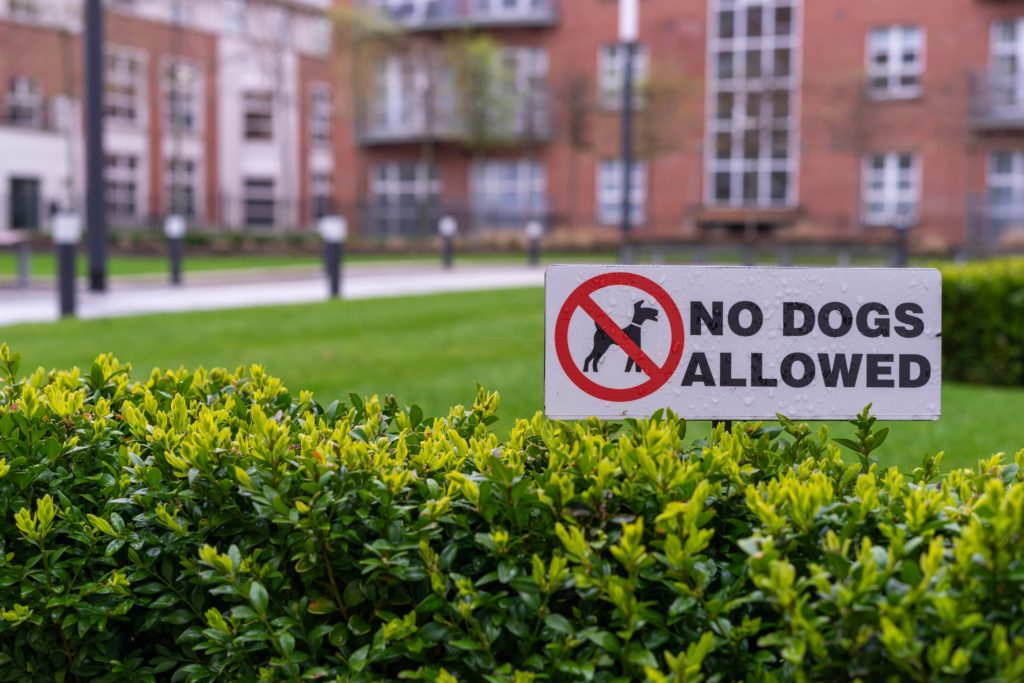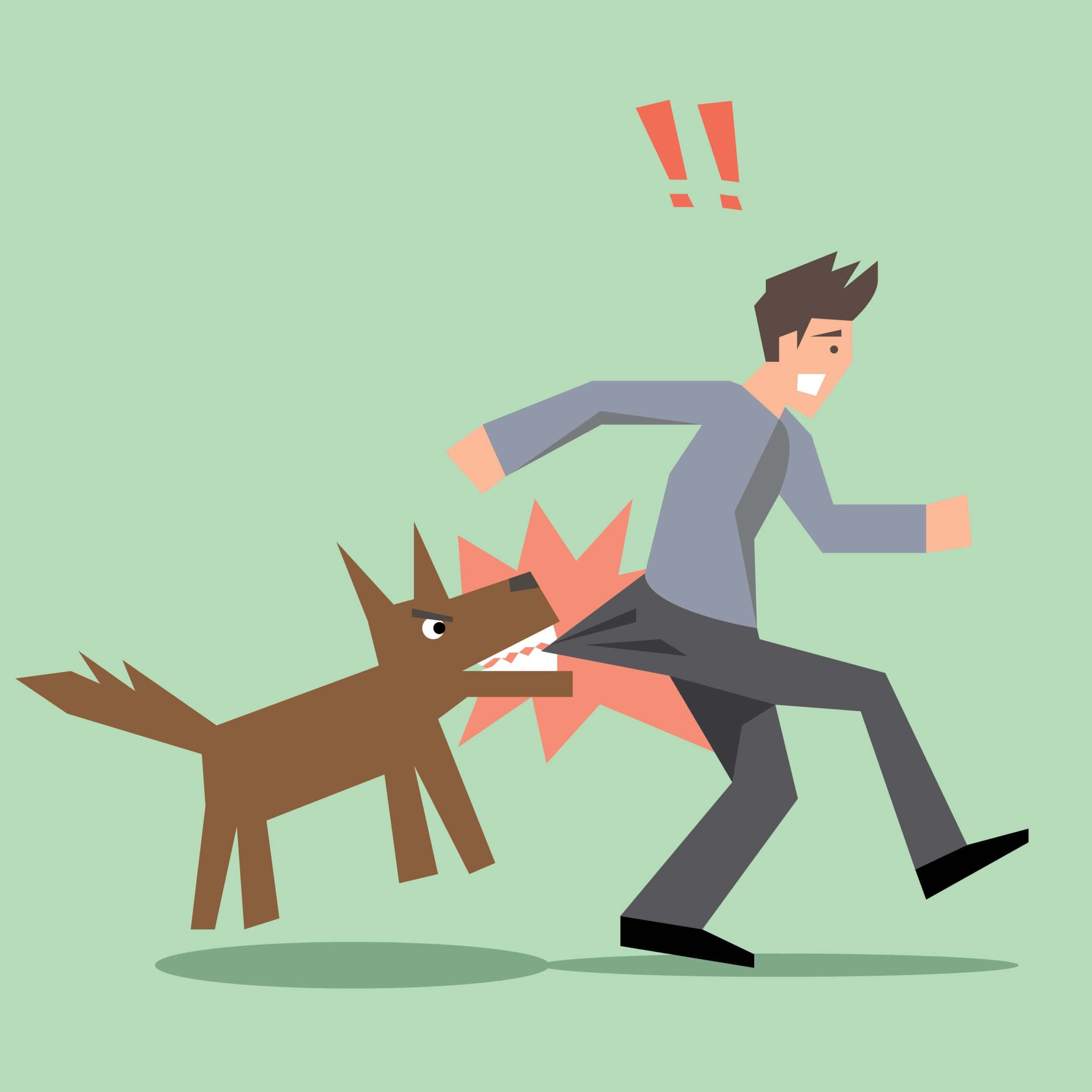You are walking down a familiar street with your dog when suddenly, your dog attacks a person who was passing by. You are alarmed, and start thinking, “My dog bit someone, what should I do next?”
As it turns out, dog bites are not an unusual occurrence. The Center for Disease Control (CDC) reports that in the United States, nearly 4.5 million dog bites are recorded every year of which 17% require medical care. If you find yourself in a similar situation, you should logically assess the situation and work proactively to protect yourself and your dog.
WHY DO DOGS BITE?
Dogs can bite for many reasons, but they usually do so in response to a happening or an activity. If a dog is feeling stressed or threatened, it may bite to protect itself and its boundaries. A dog could bite out of fear upon seeing an unfamiliar person or an animal approaching. Sometimes dogs bite because they are feeling unwell and would like to be left alone.
In most dog bite cases, the victim is familiar to the dog. It could be a neighbor, family member, or a friend. Some dogs that have never harmed anyone may surprisingly act in an aggressive manner. For instance, dogs having a litter of puppies may resort to biting as a protective maternal instinct. There are fewer instances of people being bit by unfamiliar stray dogs.
After your dog bites someone, the consequences depend on your dog’s breed, how severe the bite was, and what relationship you have with the victim. If the injury is minor and your dog bit a friend or family member, the issue may get resolved with some first-aid medical care and an apology. If the injury is serious and your dog’s breed is considered “dangerous”, there could be legal consequences. To know more about the ramifications, talk to an experienced dog bite attorney.
WHAT SHOULD YOU DO WHEN YOUR DOG BITES A PERSON?
In a situation where your dog has bit someone, it is natural for you to feel stressed or confused. It is important that in such cases, you should keep calm and extend assistance to the victim regardless of whether the incident took place inside or outside your property. Apologize to them for your dog’s behavior and let them know you are here to help them.
The initial step would be to regain control of your dog. Remove your pet from the scene and let the injured person know that you are taking your dog away. If the dog bite occurs inside your home, put your dog inside a crate or a secured room. If you are outside the house, place your dog in a secured place like your vehicle or tie it to an immovable object like a tree or a post. Ask people to stay away from your dog and do not allow it near the victim.
Next, attend to the injured person and offer medical assistance if needed. Evaluate the intensity of the injury by using Dr. Ian Duber’s dog bite analysis framework. In level one of the framework, the dog displays aggressive behavior without making any skin contact with its teeth. Pawing, jumping, tugging at clothing are some examples of this kind of behavior which is usually triggered by curiosity.
In level two, the teeth comes into contact with the skin but there is no serious injury. It includes tooth scrapes and may involve “slight bleeding caused by forward or lateral movement of teeth against skin”. Beginning level three, bites are considered more serious as this level consists of shallow punctures caused by one bite. The following level includes up to four punctures that are very deep and could result in bruises or lacerations.
Level five involves multiple bites or multiple attacks in one incident that lead to a level four bite. The final level is death of the victim due to a dog bite. This level is rare among human victims- there were about 36 dog bite deaths in 2018. In such cases, the victims are usually smaller prey animals like birds, rats, or domestic cats.
Fortunately, the most common dog bite levels are one and two. For any attack that you think can be categorized at level two or above, ensure that the victim receives first aid. Immediately after the bite happens, place a clean towel over the bleeding area and keep it elevated as much possible. Wash the area with soap and water and put a sterile bandage on the wound. Let your victim know that they should apply antibiotic ointment daily on the affected area.

MEDICAL ASSISTANCE AND REPORTING THE INCIDENT
A victim will need medical assistance if the bite is at level three or above. This is especially important if the victim is an elderly person or a child and therefore at a higher risk. Call 911 and have a doctor examine the wound and adjoining nerves, bones, and muscles. Although infection percolates in about 16% of untreated dog bites, it is good to check with a physician to avoid future discomfort and pain.
Be sure to exchange contact information with the victim. Get their name, phone number, residential address, or an email address in case you need to send them your dog’s vaccination history. If there were any witnesses at the incident, exchange contacts with them as well. Their testimony may be useful if the incident is taken to court.
Following this, you should report the incident to your local animal control office. They might ask you to take additional steps which you are required to perform. In Oakland, the County Department of Animal Services needs to be informed about the incident by both the owner of the dog and the victim.
California law also requires dogs that have received their rabies vaccine to be quarantined for 10 days from the date of the incident. The Department of Animal Services may allow the dog to be quarantined at home if it is a first and minor bite. In case of a severe bite, legal action may be taken against you as the owner.
You should also contact your home insurance company if the bite occurred in your property. Most insurance policies cover medical costs for such injuries. The extent of medical bills will depend on how severe the injury was. In some instances, repeated surgeries may be needed to fix the damage. If you live in Oakland, a dog bite lawyer can work with you to determine these costs.
DOG BITE LAWS IN THE UNITED STATES: STRICT LIABILITY
In most dog bite cases, victims look to the owner for compensation of medical expenses. Depending on the circumstances of the bite and the location of the incident, a victim may file a civil suit based upon negligence by the dog owner. A case could also be filed on the basis of a strict-liability rule in which an owner is held responsible despite the owner’s carelessness or the animal’s biting history.
In California, the owner is liable for all damages incurred by the victim if the incident happened in a public place or “lawfully in a private place”. California permits exception under certain conditions like a governmental agency using dogs to perform military or investigative police work. In such cases, action cannot be brought against a police dog who was defending itself from harassment or any kind of provoking act. The same principle applies if the dog was executing a warrant, defending an officer, apprehending a suspect of a criminal activity, and investigating a possible crime scene. To know more about dog bite laws in California, you can speak to a lawyer or check out this website.
ONE-BITE RULE
Some states do not have dog-bite laws, and in those states, the “one-bite rule” principle applies. According to this rule, if the owner was aware that their dog is dangerous prior to the bite occurs, the owner is held responsible for all injuries. In states having strict liability laws, the one-bite rule might come into play under several circumstances where strict liability does not apply. An example of this is a bicyclist being injured by a chasing dog.
Based on the one bite rule, several factors about the dog’s history are taken into consideration while determining if the owner is liable. Previous bites by a dog or a puppy indicate that a dog owner was not noticing the fact that their dog is dangerous. However, if a barking dog with no prior biting history bites someone then its owner might not be held liable.
By contrast, if a dog regularly growls at strangers and the owner did not take sufficient precautions to ensure public safety, then that counts as liability. Playful dogs that are large and have a habit of jumping on people may be considered dangerous. This is because the animal’s jumping tendency may knock over a small guest.
An owner may also be liable if their dog has a tendency of running after bicyclists or motorcyclists. Dog owners might be exempted if their dog has a history of biting other animals but not people. A dog’s behavior toward other animals is not seen as a reliable indicator of how that dog will behave around humans. The only exception is if the dog was trained to fight people and thus the owner would be knowing that their dog could become vicious.
Past complaints made by neighbors, friends or family members regarding the dog are also taken into consideration if the dog has bit or threatened a person. Courts in some states may also question the breed of the dog. Dogs like pit bulls and large sized ones like German shepherds are perceived dangerous. However, the final judgement does not solely depend on the dog’s breed. The facts of the case and the nature of the jury or judge adjudicating also impact the outcome.
Sometimes defense is permitted for owners of aggressive dogs if the owner can prove that the dog was provoked before the attack. This is also applicable if the dog risked injury voluntarily or the victim was injured while trespassing on the owner’s private property where the dog was confined. Check out this blog to know more about the legal defenses of a dog owner.

GETTING AN ATTORNEY FOR A DOG BITE CASE
Consider hiring an attorney to work with you on your dog bite incident. An experienced attorney will help you get acquainted with dog bite laws and determine next steps. If you were injured due to a dog bite, an attorney will help you in gathering all details. These include, but are not limited to, evidence proving your location at the time of the incident to the compensation you deserve for your injuries.
FAQ
-
What will happen after I report a dog bite incident?
If the victim has sought medical assistance due to a dog bite, the doctor is required to report to the health department. This information is used to identify where the bite occurred, determine if a rabies outbreak has happened and curb the spread of the disease.
In the state of California, you are also required to quarantine your dog for 10 days. This is because an animal with rabies can only transmit the disease after the signs have developed. The development of these signs is followed by the death of the animal.
-
Will my dog be put down for biting my neighbor?
The legal consequences for a dog bite varies from one state to another. If the bite is severe and the victim is not willing to cooperate, the chances of your dog being euthanized are high. Though major injuries can escalate the chances, a lawyer can help best ascertain what the legal consequences could be and how you can possibly prevent such an event from happening.
-
If my dog was provoked before an attack, how can I prove my dog was not entirely responsible?
It is possible that you may not be held liable for a dog bite incident where your dog was provoked before an attack. Contact a lawyer who will help gather evidence to represent your case in court.
Need a lawyer for a dog bite case in Oakland? Contact Quirk Reed law firm to speak with an attorney today.

